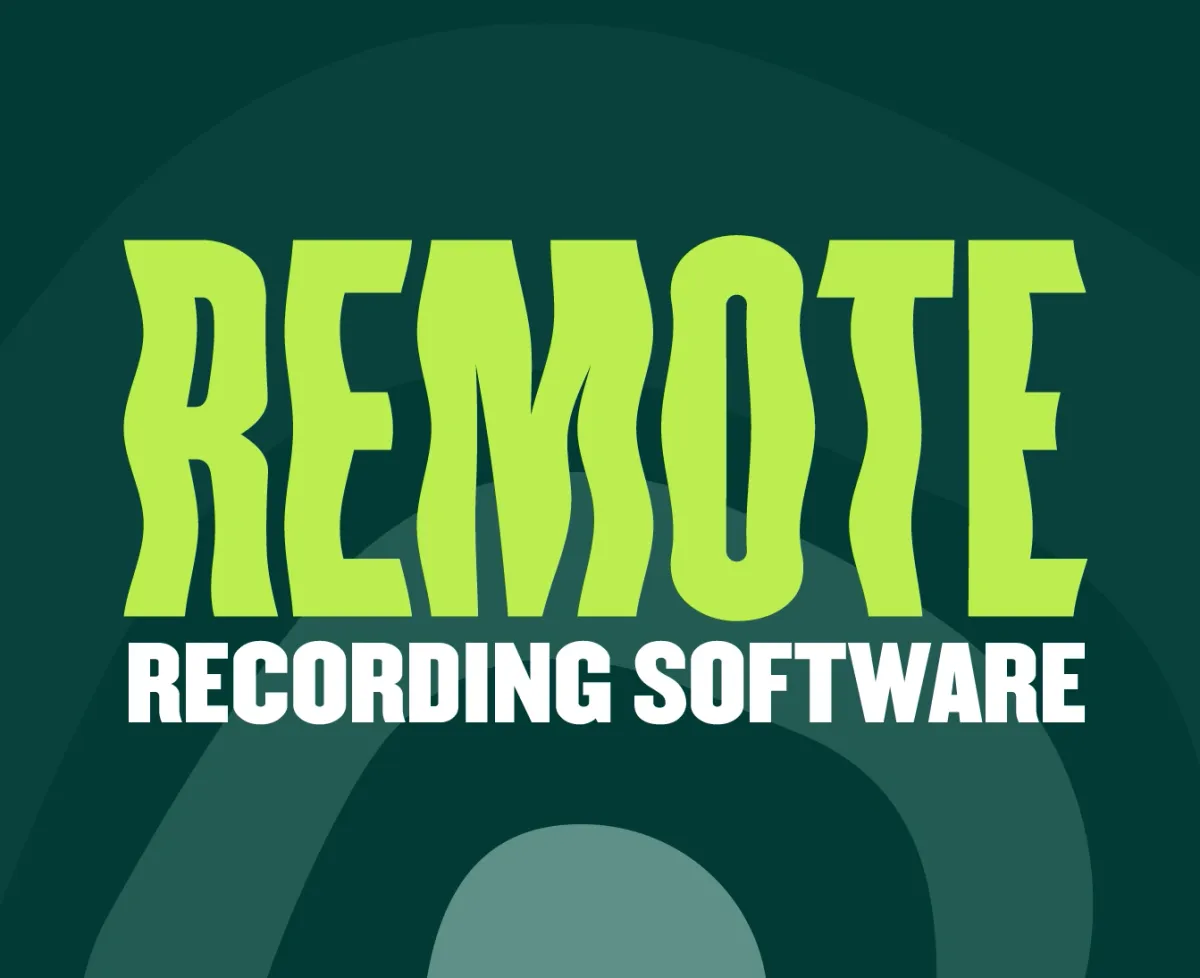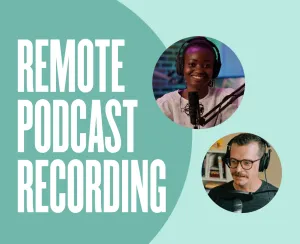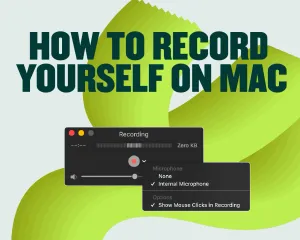Remote Recording Software for Podcasters
Are you planning to start a successful podcast? Or maybe you're looking for some new software to replace your current tools.
That's why we're here: we want to help make podcasting easier for everyone by breaking down what works best at different levels of expertise.
Check out our recommendations for the best software out there for podcasters:
1. Podcastle
Podcastle is an AI-powered remote recording platform that allows you to record and publish high-quality podcasts.
Initially, Podcastle was launched as a Chrome extension that turns any article into a podcast. But today, it is an all-in-one audio creation platform that is accessible on the web and iOS devices.
It offers a comprehensive set of tools and features such as an audio editor, automated background noise remover, text-to-speech converter, AI-powered Revoice tool, collaborative features, and now also a hosting hub.
Key Features of Podcastle
-- You can polish your voice with a single click using its generative AI technology.
-- You can record remote interviews and host up to 10 participants per call.
-- Podcastle is available both on the web and on iPhone.
-- Its editor makes it simple to create an edit in just a few clicks.
-- In addition, Podcastle has built-in tools for adding sound effects and music as well as text-to-speech and transcription tools.
Podcastle Pricing
Podcastle offers a free plan. Access to advanced features requires a premium plan that starts from $11.99 per month.
| Key Features | Pricing | Free Version |
|---|---|---|
| AI-powered, remote interviews, audio editing | From $11.99/month | Yes |
2. Movavi Screen Recorder
Movavi Screen Recorder is powerful and easy-to-use remote recording software for quick sharing your screen activity. It can help you to record Skype calls, video tutorials, online meetings, webinars, and more in high quality.
With this tool, you can adjust the recording area, apply mouse click effects, schedule recording tasks in advance, draw on the screen, and save your recordings in various formats. It's available for Windows and Mac.
Key Features of Movavi
-- Capture your screen, system sound, webcam, and microphone audio simultaneously
-- Create screenshots with a single click
-- Record mouse clicks
-- Add annotations to the recording
-- Provides a built-in video trimmer
-- Allows export to YouTube and Google Drive
Pricing of Movavi Screen Recorder
Movavi offers you the chance to download the free version of its Screen Recorder or purchase the software and be able to record videos without any watermarks and other trial limitations.
If you want to purchase their software, Movavi offers three options: Screen Recorder for $18.95, Screen Recorder + Video Editor for $55.95 and their Video Suite which comes for $57.85. Keep in mind though that usually this is not the final price. The company often provides discounts.
| Key Features | Pricing | Free Version |
|---|---|---|
| Screen recording, mouse click effects, annotations | From $18.95 | Yes (watermarked) |
3. Audacity
Audacity is one of the most popular remote recording software for podcasters. It has various recording and editing features for Mac and Windows audio files.
The best thing about this remote recording software is that it is absolutely free and easy to use.
When you explore their official website, you will discover instructions for downloading the software on the supported operating systems (Windows, Linux, and Mac).
Key Features of Audacity
-- Allows multitrack audio and batch processing.
-- Audacity is compatible with sound quality levels of 16, 24, and 32 bits.
-- Provide a real-time preview of LV2, VST, LADSPA, and Audio Unit effects.
-- Audacity can capture live audio using a microphone or mixer.
-- You can export your recordings in a variety of file formats.
Pricing of Audacity
Audacity is a free, open-source audio editing tool for recording, editing, and processing audio files.
| Key Features | Pricing | Free Version |
|---|---|---|
| Multitrack audio, real-time preview, free | Free | Yes |
4. Spreaker
Spreaker is another excellent podcasting software on our list that allows you to create podcasts with a built-in player or upload your MP3 files to play in it
Spreaker offers similar features to Audacity but also includes some unique features that make it stand out from its competitors.
It has various features, including commenting on episodes, sharing links to episodes or other content, and subscribing to shows via RSS feed or email.
Key features of Spreaker
-- Its mobile version can provide real-time information on the listening trends for various episodes, geography, plays, sources, etc.
-- You can easily use Skype to connect with your co-host if they are not in the same space as you while recording with Spreaker Studio's desktop version.
-- Spreaker lets you create and schedule several podcasts through one account.
Pricing of Spreaker
With its free version, you can enjoy 5 hours of audio storage for free. After that you need to purchase its premium plans that start from $20 per month.
| Key Features | Pricing | Free Version |
|---|---|---|
| Built-in player, episode sharing, subscription | From $20/month | Yes |
5. Zencastr
Zencastr is another great remote podcasting software that can record live streaming audio from computers and mobile devices using built-in microphones or external mics.
Moreover, it allows users to host their podcasts and distribute them via their website or social media channels such as Facebook or Twitter
Furthermore, Zencastr comes with a fantastic feature that automatically removes unwanted filler words and dead air from your podcast.
Key features of Zencastr
-- Zencastr allows you to record videos in 4k resolution for a high-quality video experience.
-- With ZenCloud Sync, you can download your master recordings from any place and share them with your team.
-- It lets you customize your podcast by easily adding a custom intro, advertisements, or any other audio tweaks.
Pricing of Zencastr
Zencaster offers a free trial for 14 days to explore its functionality. After that, you can choose from three of its packages: the Professional ($18/month), Growth ($45/month), Thought Leader ($91/month).
| Key Features | Pricing | Free Version |
|---|---|---|
| Live streaming, automatic filler word removal | From $18/month | Free Trial only |
6. Riverside
Riverside gives you the tools to manage, edit and publish your podcast. This software is designed to help you produce your podcasts, whether they’re recordings of yourself talking or interviews with experts in your industry.
Key features of Riverside
-- During live video podcast recording sessions, you can play pre-loaded video segments straight from your Riverside account.
-- You can save your recordings to iCloud Drive or Dropbox for easy access on multiple devices.
-- With its automated transcription feature, you can quickly convert your video podcasts into text files.
Pricing of Riverside
Riverside offers a free plan with which you can get the taste of the software. In case you want more of it, you can try one of its paid packages that start from $15/month.
| Key Features | Pricing | Free Version |
|---|---|---|
| Video podcasting, automated transcription | From $15/month | Yes |
7. SquadCast
SquadCast is web-based software for remote recording and producing high-quality audio and video material.
It delivers exceptional audio quality and outperforms Zencastr in this segment.
Furthermore, podcasters can use this software to share their ideas and stories with the audience without downloading and installing any external software or extensions.
Key Features of SquadCast
-- This remote podcasting software complies with GDPR, ensuring total security.
-- While editing, you can tweak specific sections of each track to clean, filter, mute, or adjust volume levels.
-- All recordings are continually and automatically stored in the cloud for backup
-- Other user-friendly features include a green room option, recording and screen sharing, and better audio mastering.
Pricing of SquadCast
SquadCast provides a four-tier pricing model with monthly or annual payment options.It has also started to offer a free plan that has everything you need to start. The premium plans start from $12/month.
| Key Features | Pricing | Free Version |
|---|---|---|
| High-quality audio, GDPR compliant, cloud storage | From $12/month | Free Plan |
8. Podbean
Podbean is a user-friendly and cost-effective podcasting software for novice and experienced podcasters.
Further, this software also offers a free website and various professional themes to modify its appearance. In addition, Podbean now provides an app that allows you to post episodes directly from your phone.
Key Features of Podbean
-- Podbean provides detailed information on who is listening, which episodes are most popular, and your listener retention.
-- They feature a marketplace for advertising and a donation option.
-- Podbean offers a social media auto-sharing feature that instantly shares your new episodes on different social media platforms.
Pricing of Podbean
PodBean is free to start. They also offer several premium subscriptions that start from $9/month.
| Key Features | Pricing | Free Version |
|---|---|---|
| Listener analytics, marketplace for ads, auto-sharing | From $9/month | Free Plan |
9. Alitu
Alitu is a platform for recording and hosting podcasts with an easy-to-use interface and automated audio processing. It is a robust tool for people who don't care about minor technicalities and prefer to focus on the content.
Features of Alitu
-- Alitu offers features like Normalization, noise reduction, and automated cleanup.
-- Alitu features a show-branding option that allows you to make theme music and unique jingles, effects, and transitions.
-- It allows you to add the music at the episodes' start, middle and end.
Pricing of Alitu
There are two pricing options which are $38 per month or $379.92 per year if paid annually. In addition, Alitu offers a 7-day free trial.
| Key Features | Pricing | Free Version |
|---|---|---|
| Automated audio processing, show branding | From $38/month | 7-Day Trial Only |
10. Ringr
This software is for you if you want audio files with the quality of recordings created in a professional studio. Ringr is available on both the Android mobile and iOS app stores.
Key Features of Ringr
-- Offers conference calls with more than 4 participants.
-- Audio recordings at up to 48kHz.
-- Provides recordings with multiple tracks.
Pricing of Ringr
Rignr offers a free trial for 7 days to access its premium features. After that, its premium plans start from $7.99/month.
| Key Features | Pricing | Free Version |
|---|---|---|
| Professional studio quality, multiple tracks | From $7.99/month | 7-Day Trial only |
11. Auphonic
Auphonic is another popular remote recording software for podcasting that improves the quality of your podcast episodes by polishing your audio files.
It is compatible with both desktop and mobile devices.
Key features of Auphonic
-- The Audio Restoration feature reduces noise and humming sounds automatically.
-- Adaptive Leveler balances overall loudness by correcting level variations inside a single file across speakers, music, and dialogue.
Pricing of Auphonic
Auphonic is entirely free for the first 2 hours of processed audio every month. After that, you can subscribe to their premium plans which start from $10/month.
| Key Features | Pricing | Free Version |
|---|---|---|
| Audio restoration, adaptive leveling | From $10/month | Free (limited hours) |
12. Spotify for Podcasters
Spotify for Podcasters is a free podcast recording and hosting platform. This tool promotes usability with simple tools that guide you through every step of your podcasting journey.
However, Spotify for Podcasters lacks several desired features, including advanced editing and mixing options across all devices.
Key Features of Spotify for Podcasters
-- It features a podcast monetization option with two revenue sources to select from.
-- It provides detailed insights and stats on the performance of your podcast.
Pricing of Spotify for Podcasters
Anchor is completely free and offers unlimited hosting.
| Key Features | Pricing | Free Version |
|---|---|---|
| Monetization, performance insights | Free and unlimited hosting | Yes |
Top 12 Remote Podcast Recording Software Comparison
Let's sum it up with a quick comparison chart of the 12 remote recording software options, highlighting their key features, pricing, and availability of free versions.
| Software | Key Features | Pricing | Free Version |
|---|---|---|---|
| Podcastle | AI-powered, remote interviews, audio editing | From $11.99/month | Yes |
| Movavi Screen Recorder | Screen recording, mouse click effects, annotations | From $18.95 (Paid version) | Free Version |
| Audacity | Multitrack audio, real-time preview, free | Free | Yes |
| Spreaker | Built-in player, episode sharing, subscription | From $20/month | Free Version |
| Zencastr | Live streaming, automatic filler word removal | From $18/month | Free Trial |
| Riverside | Video podcasting, automated transcription | From $15/month | Free Version |
| SquadCast | High-quality audio, GDPR compliant, cloud storage | From $12/month | Free Plan |
| Podbean | Listener analytics, marketplace for ads, auto-sharing | From $9/month | Free Plan |
| Alitu | Automated audio processing, show branding | From $38/month | 7-Day Trial |
| Ringr | Professional studio quality, multiple tracks | From $7.99/month | 7-Day Trial |
| Auphonic | Audio restoration, adaptive leveling | From $10/month | Free (limited hours) |
| Spotify for Podcasters | Monetization, performance insights | Free | Yes |










